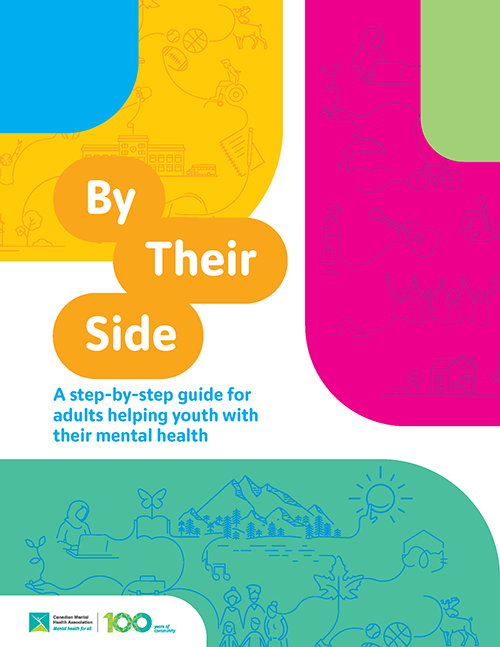Menu
Close
By Their Side: A step-by-step guide for adults helping youth with their mental health
May 13, 2022
You are a parent, caregiver, teacher, education worker, counselor, or coach. Whatever your role, you are an adult ally of a young person in your life. And you may be concerned about them. The By Their Side guide was developed as a starting point to help answer questions adult allies may have when helping youth with their mental health.
Youth across Canada are no strangers to mental health struggles. As we increasingly encourage them to open up and are providing many opportunities to do so, it is critical that we, the adults in their lives, have what we need to support them.
The purpose of this Guide is to better prepare adult allies for conversations with youth about mental health and well-being. It is also designed to equip adult allies to respond to youth who may be experiencing mental health or substance use challenges. It provides tools to support disclosure and to connect youth to the help they need. By exploring this guide, adults will gain knowledge and skills to help youth understand mental health issues, and mental illness, and to develop suicide resilience.
The Canadian Mental Health Association encourages adult allies to use this resource to assist youth who have questions or concerns about their mental health.
By Their Side Quiz
The following 4 short quizzes each correspond to a section of the Guide. Once you’ve completed reviewing the Guide, use the true/false questions to check in with yourself about what you learned. You may want to re-read the content if you find you have not retained the information. It is important that you be prepared to talk, and to help the young people in your life.
Section 1
True
False
1. Having good mental health means that you don’t have a mental illness.
2. Social and economic factors affect a youth’s mental health.
3. Research shows that LGBTQ2S+ students are bullied just as often as their peers.
Your Score Is:
1. Having good mental health means that you don’t have a mental illness.
• FALSE: Mental health is more than the absence of a mental illness. According to the World Health Organization, mental health “is a state of well-being in which the individual realizes their own abilities, can cope with the normal stresses of life, can work productively and fruitfully, and is able to make a contribution to their community.”
2. Social and economic factors affect a youth’s mental health.
• TRUE Discrimination and inequity in areas such as education, housing, employment and family can seriously impact mental health.
3. Research shows that LGBTQ2S+ students are bullied just as often as their peers.
• FALSE: LGBTQ2S+ youth suffer much more bullying and violence than their peers. This increases their risk of depression, substance use and self-harm.
Section 2
True
False
1. As an adult ally, you should be able to provide everything a youth needs to take care of their mental health.
2. Youth in your life may not be ready to discuss their mental health the first time you ask.
3. Your emotions, biases and values affect how you support youth in distress.
Your Score Is:
1. As an adult ally, you should be able to provide everything a youth needs to take care of their mental health.
• FALSE: It’s important to be aware of the signs of mental distress. However, you have to understand your limits. As a caring adult, you’re not expected to be a therapist, so be sure to ensure youth get the professional care they need, when they need it.
2. Youth in your life may not be ready to discuss their mental health the first time you ask.
• TRUE: Someone might not be ready to talk about their mental health immediately. They may need a bit of time in order to feel safe to talk to you. It may be helpful to change topics and return to the subject later.
3. Your emotions, biases and values affect how you support youth in distress.
• TRUE: Your own feelings can have a significant impact on your conversation with youth and may affect their willingness to share their thoughts. Discussing mental health can be very difficult because it is still taboo. So be aware of your biases and reactions and try to stay calm by breathing or taking a second to rest and collect yourself first.
Section 3
True
False
1. Safety plans should be written during a suicidal crisis.
2. Safety plans are effective at reducing the risk of suicide.
3. Safety plans must be written by a professional.
Your Score Is:
1. Safety plans should be written during a suicidal crisis.
• FALSE: A safety plan should be written before or after a crisis, not during. When someone is in distress, they can become overwhelmed with suicidal thoughts and confusion, and may not be thinking clearly. This plan is preventative and lets a young person connect with their reasons for living.
2. Safety plans are effective at reducing the risk of suicide.
• TRUE: Safety plans have been proven to work because they focus on a person’s strengths and identify their unique abilities, which they can draw on when suicidal thoughts become intense. The goal here is to help them weather the storm by focusing on what works to keep them safe and enjoying life.
3. Safety plans must be written by a professional.
• FALSE: A professional isn’t needed to write a safety plan. They can be co-developed by the person at risk with an adult who is in a trusting relationship with them.
Your Score Is:
Section 4
True
False
1. Self-care is intuitive and not something we should have to learn.
2. Stress is just something adults have to live with.
3. Being busy is a part of our culture that we should fully embrace.

